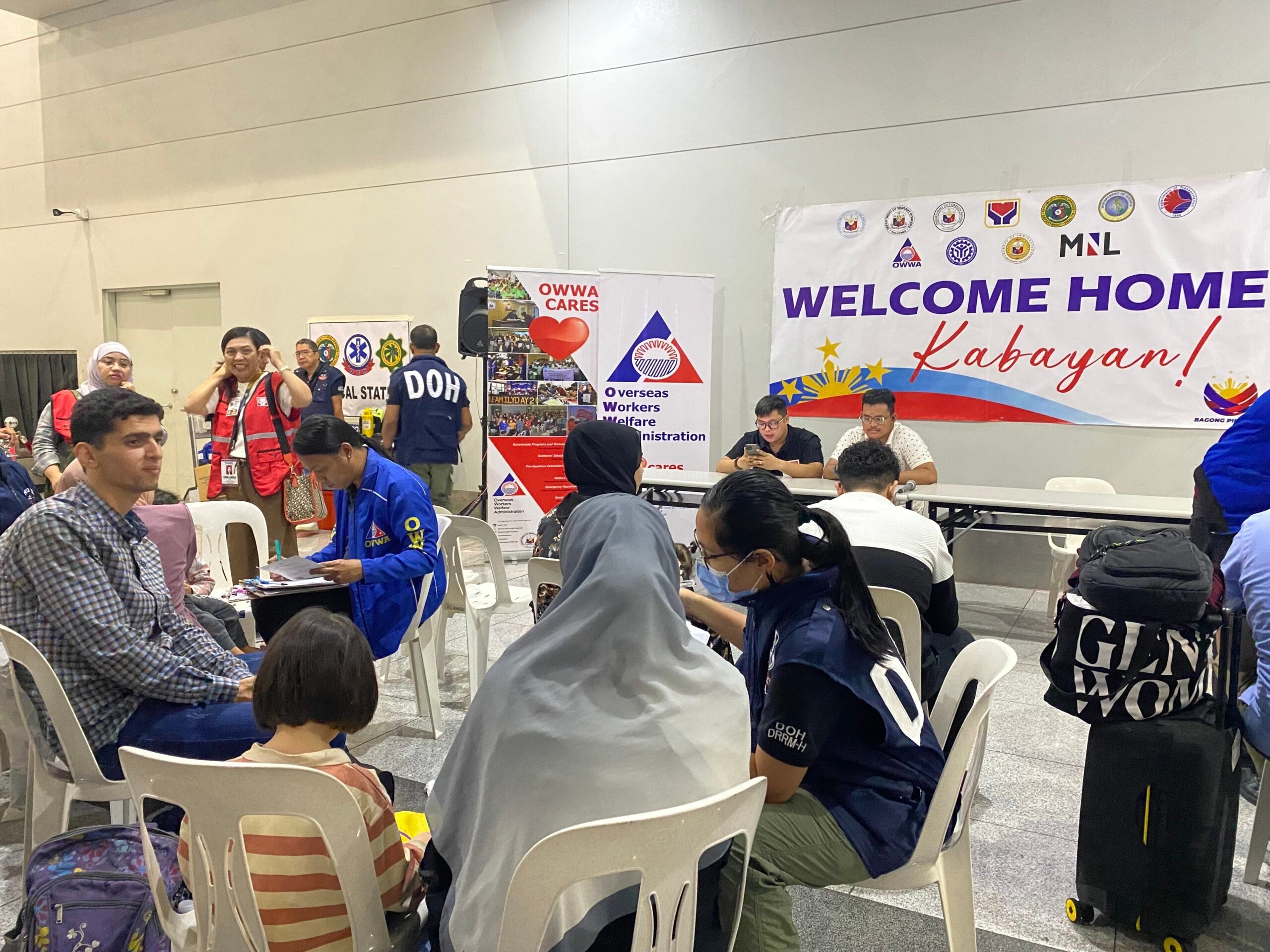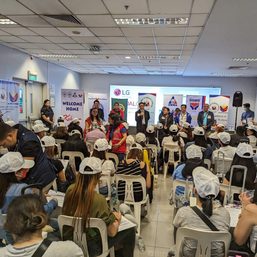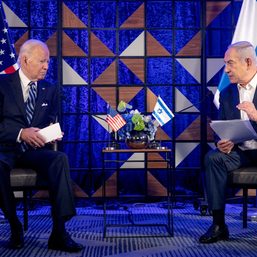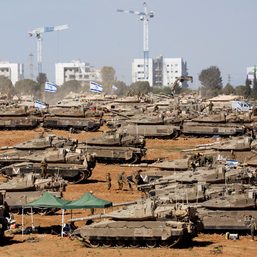SUMMARY
This is AI generated summarization, which may have errors. For context, always refer to the full article.

MANILA, Philippines – Nadia Alzanski, a Filipina in Gaza, had accepted her fate. While her name was on the list of individuals allowed to cross the Rafah border, her husband’s was not. If he stays, she stays.
Nadia and her husband, who reside in the Philippines, were only visiting relatives in Gaza when war broke out after a matter of days. There was no certainty that they would be able to leave and return home to the Philippines.
A negotiation at the border eventually allowed both of them to get across, but it was an emotional month filled with uncertainty. The two were part of the batch of Filipinos, their Palestinian spouses, and their children who arrived in the Philippines from Gaza on Wednesday, November 15.
This batch of 14 Filipinos and six Palestinian spouses is the last to cross the Rafah border to Egypt for repatriation to the Philippines for now, according to Department of Foreign Affairs (DFA) Assistant Secretary Paul Cortes.
Depleted supplies, a bombed neighbor
Twenty-two-year-old Nadia’s relatives lived just 10 minutes away from the Rafah border, but it took four trips of going back and forth before they were able to cross and make their eventual trip home.
When the war broke out on October 7, only days passed when the family lost food, electricity, and water. The border had closed. The bakeries that sold their bread were bombed. That was when they decided that it was time to go home. Nadia’s family was in the Philippines, but her husband’s whole family was in Gaza.
By around October 10, the house of their next-door neighbor was bombed.
“Noong binomba po yun, wala kaming makita. Kasi po ‘yung usok, sobrang bilis po eh. Either mamamatay po kami sa bomba or sa suffocation. Kasi po, sobrang parang na-trap po kami sa bahay. Hindi po namin alam kung safe po lumabas since may bomba nga po or maGsi-stay kami sa bahay,” said Nadia upon their arrival in Manila.
(When the neighbor’s house was bombed, we couldn’t see anything. Because the smoke [filled the area] so fast. We were either going to die from the bomb or suffocation. We were trapped in the house. We did not know if it was safe to leave because there might be more bombs, or if we should just stay at home.)
While there were shelters and evacuation centers around, the family was unsure if they were safe. They were also full.
Schools were also bombed. She knew that the inward bombs she witnessed came from Israel, because when the Hamas attacked, they were aimed towards outside Gaza.
Leaving relatives behind
When the family mulled over crossing the border to Egypt, there was a question of how to start over again. Nadia and her spouse had a life in the Philippines, but her in-laws’ world was Gaza.
ALSO ON RAPPLER
- 40 Filipinos exit Gaza through Rafah crossing
- Dozens of Filipinos in Gaza to evacuate via Rafah border crossing
- Senators want higher DMW 2024 budget as cut seen to hurt welfare projects
- [PANOORIN] Ano ba ang hugot ng Israel-Hamas war?
“Pag lumabas pa sila, saan po sila? Siyempre, hindi naman po pwede mag-start sila from the beginning. Kasi matatanda na po sila. Doon na po sila lumaki, doon na po sila mamamatay. ‘Yun po ‘yung thinking nila,” she said.
(If they leave, where would they go? Of course, they couldn’t just start from the beginning, because they are old. They grew up there, so they would die there. That was their thinking.)
Despite the border being 10 minutes away, getting there was difficult and expensive, because gas was scarce. Names were called out at the border if an individual was cleared to cross.
At the border, Nadia felt like she was in a movie.
“Lahat po ng tao umiiyak po. Nagmamakaawa po na sana makalabas na po sila… Meron po mga sugatan po sila, nagbabakasakaling makalabas since wala na po talaga mga hospital na Gaza. Kung meron po, sobrang limited lang po. Tapos inuuna po yung mga critical po. Hindi ko po ma-explain sa inyo yung totoo. Ang nangyayari dun, through words, hindi ko po ma-explain,” she said.
(Everyone was crying. They were pleading to be let out… There were some injured, taking their chances to be let out because there are no more hospitals in Gaza. If there were, they were very limited, and those in critical condition were the priority. I cannot explain to you the truth [of how it was]. What happened there, through words, I cannot explain.)
With Nadia’s husband not on the list to cross, she was ready to stay behind.
“Tinanggap po na po na hindi na ako lalabas, kasi hindi ko po siya iiwan eh, kahit ano po mangyayari. Kahit bombahin na po ako doon, okay lang. Basta magkasama po kami. Either lalabas po ako kasama siya or hindi ako lalabas,” she said.
(I had accepted that I will not exit, because I won’t leave him, no matter what happens. Even if I get bombed there, it’s okay. As long as we are together. Either I leave with him, or I stay behind.)
Philippine authorities had cautioned Nadia that this could be her last chance to leave, but she was firm in staying with her husband.
Eventually, they had found a way to negotiate for her husband’s clearance at the border because he had travel documents for refugee status in the Philippines. He also had a passport that was not Palestinian.
It was a big relief for Nadia. But despite being grateful to go home, she cannot say she is happy. They have at least 27 relatives who died in the conflict.
“Sobrang grateful. Hindi ko talaga masabing masaya po eh. Kasi pagkatapos po yung nangyayari sa amin doon, hindi ko alam kung kailan ko masasabing masaya. Saka kung ano yung na-witness ko po, mga bata po na namamatay,” she said.
(I’m very grateful. But I cannot say I’m happy. Because after what happened to us there, I don’t know when I’ll be able to say I’m happy. I also witnessed children dying.)

Difficult decisions
DFA Assistant Secretary Cortes said on Wednesday that the department continued to try and convince the remaining 26 Filipinos in Gaza to leave, but they understood the thought process of those who needed to stay.
“Our embassy in Jordan stays in contact with them and monitors those in Gaza to convince, to tell them, to ask them what their plans are. Of course, at the end of the day, they rely on their own circumstance and their own decision-making, whether or not they really want to leave Gaza and come back to the Philippines to rebuild their lives,” he said in a mix of English and Filipino.
The batch of 20 included children. Cortes said that a lot of the parents were grateful to be able to come home and focus on raising their children in a more stable environment.
He added that the government was exploring policies that could help these types of Filipino repatriates who grew up abroad and did not have lives in the Philippines.
“In the national government, there are difficulties in these types of cases when we have Filipinos who have lived abroad for several decades, and then come back home and have to begin from scratch. We do not have guidelines or criteria on how to spend or what to spend for them,” he said.
The repatriates were given an initial financial assistance of $1,000 from the DFA, Cortes said.
Israel has put Gaza’s entire population of 2.3 million under siege, pounding the crowded territory with air strikes. Gaza health officials say more than 11,000 Palestinians have been confirmed killed, around 40% of them children. – with a report from Reuters/Rappler.com
Add a comment
How does this make you feel?



![[Only IN Hollywood] Spider-Man’s Pinoy bestie beats Fall Guy; Fil-Am voices Pixar film character](https://www.rappler.com/tachyon/2024/05/only-in-hollywood-may-8-2024.jpg?resize=257%2C257&crop=314px%2C0px%2C720px%2C720px)
![[Vantage Point] Philippine economic reforms run into headwinds](https://www.rappler.com/tachyon/2024/05/ph-economic-headwind-may-2024.jpg?resize=257%2C257&crop_strategy=attention)





There are no comments yet. Add your comment to start the conversation.